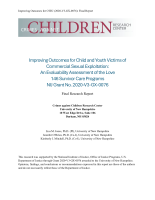Nonprofit organizations
Baltimore's Comprehensive Communities Program: A Case Study, 1998
Raising Our Cities' Children: Safe Productive Places in the After-School Hours
Communities and Crime Control: Workshop Proceedings
Improving Outcomes for Child and Youth Victims of Commercial Sexual Exploitation: An Evaluability Assessment of the Love 146 Survivor Care Programs
Building Knowledge About Victim Services
Provider perspectives on delivering telemental health services in rural North Carolina: Field report
Campus Sexual Assault Responses (CSAR): Informing Trauma-Informed Policies, Protocols, and Training
Sexual violence is a significant criminal justice problem with long-term effects for its victims. In particular, sexual assault on or related to college campuses across the United States presents a growing public health and economic burden, starting with significant impacts on academic outcomes.
See the YouTube Terms of Service and Google Privacy Policy
Criminal Justice Testing and Evaluation Consortium
Tribal Crime, Justice, and Safety, Part 1
Research indicates that Native American persons experience crime victimization at higher rates than non-Native people. Furthermore, the unique position of American Indian and Alaska Native tribes as both sovereign nations and domestic dependents of the U.S. creates jurisdictional complexities in responding to crime, justice, and safety. Senior social and behavioral scientist Christine (Tina) Crossland discusses NIJ’s research on these topics, especially on the prevention of violence towards American Indians and Alaska Natives. Communications Assistant Stacy Lee Reynolds hosts.
Learning from Doing Evaluating the Effectiveness of the Second Chance Act Grant Program
Reauthorized in 2018, the Second Chance Act (SCA) aims to reduce recidivism and improve outcomes for people returning from state and federal prisons, local jails, and juvenile facilities through the provision of federal grants. During this panel, National Institute of Justice-funded researchers will detail two ongoing evaluations of the SCA grant program:
- An evaluation of the effectiveness of the SCA grant program per Title V of the First Step Act.
- A longitudinal examination of the long-term impacts of the SCA program.
See the YouTube Terms of Service and Google Privacy Policy
The Hidden Costs of Reentry: Understanding the Barriers to Removing a Criminal Record
NIJ hosted a webinar to discuss under-researched aspects of reentry: expungement of criminal records and the impact of those records. This webinar includes a presentation of ongoing research projects examining the impact of legal aid for expungement and past research projects studying the accuracy and permanency of criminal records and the prevalence of collateral consequences of conviction. A Q&A session will conclude this webinar.
See the YouTube Terms of Service and Google Privacy Policy
Just Science Podcast: Just Addressing Child Sexual Violence
Implementing NAGPRA Connecting Medical Examiner and Coroner Offices to Tribal Partners
This project is designed to connect tribal partners to ME/C offices to facilitate successful disposition protocols for non-forensically significant Native American remains that are compliant with the Native American Graves Protection and Repatriation Act of 1990 (NAGPRA).
See the YouTube Terms of Service and Google Privacy Policy




